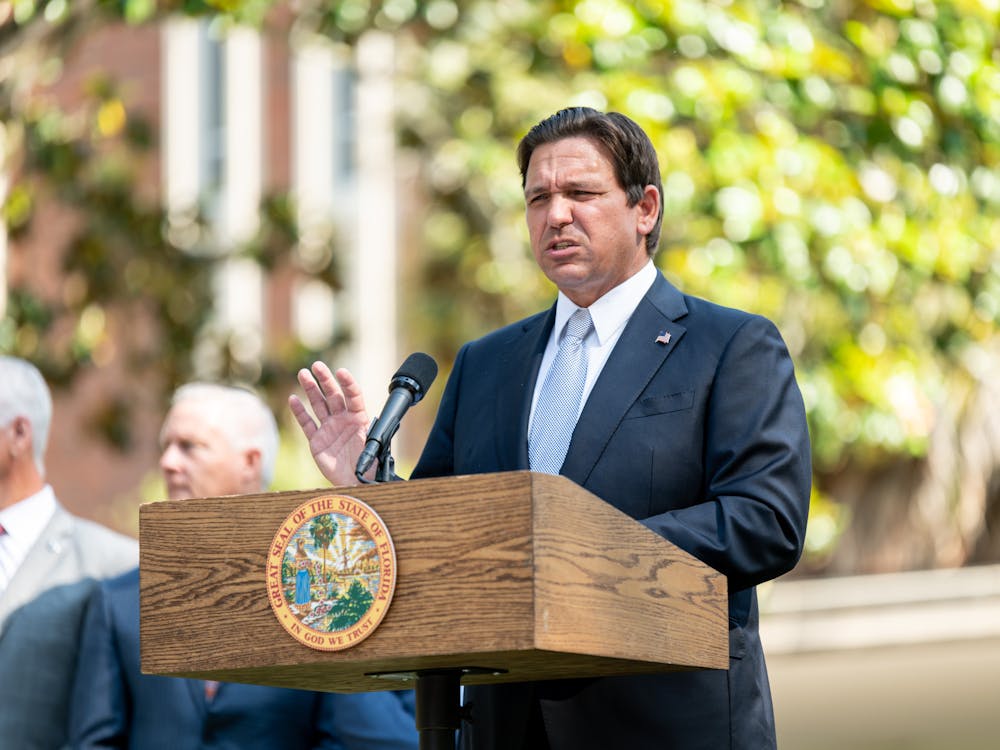CORRECTION: The article has been updated to reflect that the Gainesville City Commission is in recess until July 15. The Alligator incorrectly reported that the city was in recess until July 12.
In late May, Gainesville Fine Arts Association Executive Director Katy Lemle was gearing up for the gallery’s next season following the approval of their Florida arts grant application.
That is until she logged onto a grant webinar at the beginning of June and was told, despite receiving approval, Gov. Ron DeSantis vetoed the state’s entire $32 million grant package.
Suddenly, Lemle said her hopes for the gallery transformed into emergency board meetings, a hiring hold and a potential decrease in daily hours.
“We were definitely planning on this money,” she said. “We were relying on that money.”
Over 600 state organizations apply for the grants annually. Alachua County organizations requested over $1 million, and though some applications were initially approved, all funds were later denied.
Florida organizations expecting arts grants will be impacted by the cuts beginning July 1 through fiscal year 2025.
“We’re making big investments in our future while spending less of our taxpayer’s money to maintain our state’s strong financial standing and robust economy,” DeSantis wrote in a June 12 general appropriations letter.
DeSantis also publicly justified the veto in a June 27 press conference where he singled out the Orlando Fringe Festival, the longest running U.S. theater festival, as “sexual” and an “inappropriate use of taxpayer dollars.”
State Rep. Anna Eskamani, D-Orlando, said the event is known as an international LGBTQ+ safe space, and the cuts are a pointed attempt to impact certain communities.
“I do think that Governor DeSantis is just trying to convert his mistake into another culture war because the blowback that he's facing from these vetoes is not only large, but it spans the political spectrum that he's now just trying to make up for his bad decision,” she said.
The scale of the arts grant cuts is unprecedented and could also have potentially adverse effects on the Florida economy, she said.
“This is a part of an economic engine the governor just totally defunded that is going to most impact small businesses and local tourism,” she said.
The Gainesville Fine Arts Association is eligible for up to $40,000 in grant money, and Lemle said the nonprofit was always previously granted at least a portion of the sum, receiving $28,000 in 2023.
The organization was left in a “whirlwind” of uncertainty for the upcoming season following the decision to cut all arts funding, she said.
Lemle said she will have to seek additional community sponsors to make up lost funds.
Following the vetoes, 69% of those set to receive funding and were later denied will have to seek other sources of funding, and the 5% unable to do so will turn to closing their doors, according to the Florida Cultural Alliance.
The Gainesville Orchestra initially was approved for $25,000, before getting cut to $11,000 in March 2024 on the legislative floor and then losing funding entirely from DeSantis’ decision.
The application process was rigorous, said Gainesville Orchestra President Greg Johnson.
“If you pass the test and get the judges to give you the right score, then you get the money, but not with the state of Florida,” he said. “Even if you pass, you may not get a dime, and that's what's happened.”
Johnson said the orchestra will no longer be able to front the starting costs of expanding their youth mentoring program, where professional musicians teach fourth and fifth grade students violin.
Johnson said they also historically received grants from the city, which are now also compromised.
Following conflict between the GRU Authority and city commission over the fiscal year 2025 budget, the general funds transfer (GFT), a measure of the money the authority returns to the city annually for community operations, was cut by $6.8 million June 26.
The decision caused uncertainty about the city’s budget, which could also impact subsequent grant programs, including funding allocated for arts and culture organizations, said City Manager Cynthia Curry.
“We remain committed to offering vibrant arts and cultural programming for our community. They are investments in Gainesville’s rich cultural landscape, ones that our community expects and deserves,” said City of Gainesville spokesperson Rossana Passaniti.
However, no plan has been released concerning the exact impact GFT cuts will have on arts funding, and the city commission remains in recess until July 15.
While the Gainesville Orchestra’s formerly approved state and city grants only accounted for about 5% of their operations budget, he said the Hippodrome Theatre, which was approved for $150,000 from the state and an additional $250,000 from the city, could face closure.
The Hippodrome Theatre did not respond in time for publication.
Dance Alive National Ballet Artistic Director Kim Tuttle said the state cuts were “short sighted” and reflected a further deprioritization of the arts. The organization will still continue with their upcoming season as planned, she said.
Despite being approved for $50,000 for 2025, she said the amount they actually receive “changes with the wind” every year, and the complete elimination of all funding just adds to existing difficulties.
“The whole thing is gone. I think it's very, very sad, very disappointing,” Tuttle said. “I think that most of us that have been in this business a really long time know that this could happen.”
Contact Morgan Vanderlaan at mvanderlaan@alligator.org. Follow her on X @morgvande.
Morgan Vanderlaan is a second year political science major and a Spring 2025 metro general assignment reporter. She has previously worked on the enterprise desk as a political reporter and on the county and city commission beat. When she's not on the clock she can be found writing, reciting and watching theatre!






